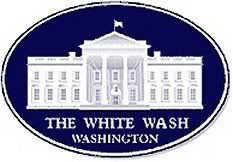White House Press Podium: Turns Men Into Weasels
 There must be an invisible force field around the podium in the White House briefing room that instantly turns anyone stepping up there from human to weasel. We're accustomed to it from Press Secretary Scott "The Lyin' King" McClellan, but have a look at the first response given by National Economic Adviser Al Hubbard, filling in as "pinch-weasel" for McClellan on Friday, when a reporter asked him about the sheer size of the national debt.
There must be an invisible force field around the podium in the White House briefing room that instantly turns anyone stepping up there from human to weasel. We're accustomed to it from Press Secretary Scott "The Lyin' King" McClellan, but have a look at the first response given by National Economic Adviser Al Hubbard, filling in as "pinch-weasel" for McClellan on Friday, when a reporter asked him about the sheer size of the national debt.Q: I can't remember the last time the President spoke about the national debt, which is now over $8 trillion. Is that something you guys worry about?Wow. You can tell this guy holds a Harvard MBA. The question was about the incredible extent of the national debt and the best this guy can say is "big deficit – bad!" But then Hubbard tries to give a real answer (as McClellan looked on in horror).
Hubbard: Well, I don't know where your $8 trillion comes from, but we --
Q: [Deadpan] The public website.
Hubbard: Well, I guess it really depends on what you're including, but let me -- again, the President is most concerned about the economy and the budget. And a key component of that, as I have spoken earlier, is the budget deficit. And, you know, that's what contributes to the overall budget debt, the country's debt, and that's why it's so important to reduce the budget deficit and, hopefully, ultimately, eliminate the budget deficit.
Q: Does the magnitude of the national debt disturb you?Kind of scary when one of the president's chief economic advisors needs to be referred to a web site to get some numbers on the national debt. Hubbard to Bush later that day: "Dude, I looked at that web site and that national debt thing is huge!"
Hubbard: Actually, again, I don't know what numbers you're using, but the current budget debt is not a problem, but we do not want it to grow as a percentage of the GDP. That's the way you want to look at it, is the debt as a percentage of GDP. And our budget debt is lower than many other developed countries. The President is committed to keeping it low; that's why he wants to cut the budget deficit in half by 2009.
But, you know, the biggest -- and this is off-balance-sheet -- the biggest problem we face are the unfunded liabilities of our entitlements, of Social Security, Medicare, and Medicaid. For Social Security it's $11 trillion; for Medicare it's significantly higher than that. And that's why we've got to tackle entitlements. The longer we wait, the more difficult it's going to be, and that's why the President spent so much time last year talking about Social Security. That's why he will continue to talk about Social Security.
And that's why, unfortunately -- you know, I wish the Democrats were right, that we could avoid dealing with Social Security, but we can't. Every year it grows bigger by $600 billion, the problem. And the sooner we address it, the easier it's going to be to address, and that's why this President will never give up on reforming Social Security.
Q: Check the Bureau of Public Debt website, you'll see the number there.
Hubbard: Okay, thank you.
But, at least he got to the heart of this administration's economic theories. You see, the problem isn't with continued tax cuts to the wealthiest Americans during tough economic times, coupled with the staggering expense of a lengthy war – it's those damn entitlement programs!
As Bush said himself during one of the 2000 debates: "In Washington they're playing with Social Security like it's some kind of government program!"
Yeah, this is the crew we want in charge of our national finances.

















<< Home